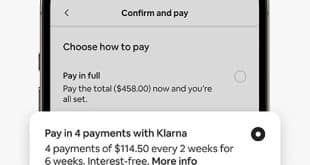PayPal Inc.’s plans to include three payment technologies—magnetic stripe, contactless, and EMV—in its upcoming mobile point-of-sale device could help the payments company capitalize on growing interest in mobile wallets.
Many companies are betting on mobile wallets. But part of the ante is ensuring consumers can use their stored credit and debit card information with a variety of payment technologies at places like food trucks and small storefronts as well as at major retailers.
PayPal plans to release its card reader, available now in the United Kingdom, later this summer in Australia and in October in the United States so that merchants using the PayPal Here mobile point-of-sale service can accept payments regardless of the form factor the consumer uses, Brad Brodigan, PayPal vice president and general manager for retail, tells Digital Transactions News. “It allows merchants to capture all forms of payments,” Brodigan says. The reader will be compatible with mobile-payment services using near-field communication (NFC) technology, such as Apple Pay, Android Pay, and Samsung Pay.
PayPal’s approach is to put all payment technology into one device. Not all are doing that. Unlike PayPal’s device, which has the NFC chip inside the mPOS reader, the Square Inc. NFC reader is separate from its magnetic-stripe and EMV reader. But Anywhere Commerce, a Montreal-based mobile-payments specialist, intends to add NFC capability to two of its mPOS chip card readers later this year.
PayPal is not releasing the pricing for the U.S. version of its reader. Its current U.K. reader sells for 49.95 pounds (US$77.52), and in Australia for A$99 (US$73.67). Square priced its NFC reader at $49.
Multiplatform readers could be critical for companies like PayPal, Square, and acquirers that resell Anywhere Commerce devices, which provide low-cost POS-acceptance devices, especially as interest in contactless capability continues to grow.
“Small merchants are captivated by Apple Pay,” says Jordan McKee, an analyst at New York City-based 451 Research LLC, in an email to Digital Transactions News. “And dual-interface terminals will help to let EMV take a backseat in the conversation between merchant-services providers and small businesses.”
In research released in April, McKee found that among merchants with fewer than 20 employees, 37% did not plan to have EMV POS terminals by Oct. 1.
Using dual-interface mPOS readers “not only provides small businesses with an onramp to the mobile-payment opportunity, it allows providers to communicate to their merchants that they have been future-proofed for any changes set to come in the payments space down the road,” McKee says.
“The beauty of technological advances and the circumstances of EMV is that now [merchants] can adopt cloud-based POS hardware that has much greater enhancements,” Brodigan says. Additionally, offering these payment options means small merchants can engage with consumers who want to use mobile wallets, he says.
Mobile wallets are one part of a digital metamorphosis in payments. “As we see the migration from traditional payments to digital payments, consumers are adopting more forms of digital payments, including mobile wallets,” Brodigan says. “They are using them when they pay online and as a growing percentage in store. While there has historically been a line between online and offline payments, mobile payments are erasing that line.”
By combining mag stripe, EMV, and NFC into one device, PayPal hopes to make it simpler for merchants to use the PayPal Here service, Brodigan says. “For a lot of merchants, POS equipment is an area of pain for them,” he says. Small merchants contend with antiquated hardware and software limitations, and they always feel less technologically capable than larger merchants, Brodigan says.





